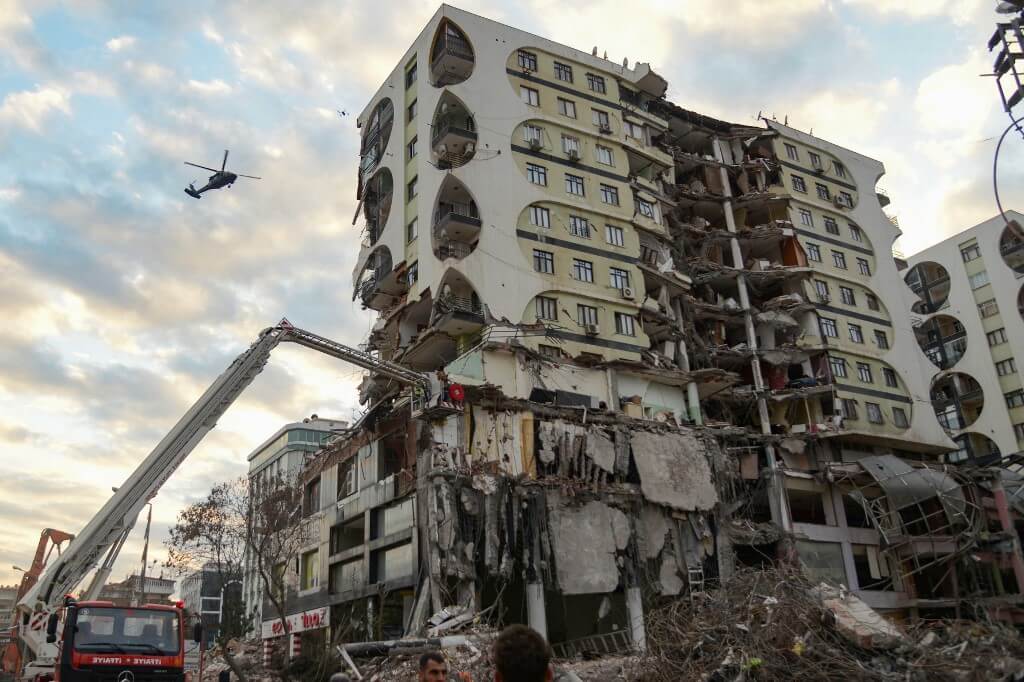Three building contractors and one civil engineer have been sentenced to more than 17 years in prison due to their role in the collapse of a building in the southeastern province of Diyarbakır in February 2023 earthquakes that claimed the lives of 89 residents, the state-run Anadolu news agency reported.
On February 6, devastating 7.8 and 7.5-magnitude earthquakes struck Turkey, claiming over 53,000 lives and leaving millions homeless in 11 provinces in the country’s south and southeast.
Diyarbakır was one of those provinces.
There were seven defendants, four of whom were in pretrial detention, in the trial that concerned the collapse of one of the four blocs in the Galeria residential complex in Diyarbakır’s Yenişehir district. Twenty-two people were also injured when the building collapsed.
Three other defendants are at large.
The Diyarbakır 11th High Criminal Court on Friday handed down the prison sentences to building contractors Sedat Eser, Mehmet Şirin Yiğit and Şeyhmus Yiğit and engineer Tevfik Demir on charges of “causing the death and injury of more than one person through conscious negligence.”
The Galeria was opened as the first shopping mall in Diyarbakır in 1999, which also housed residential buildings. The three other blocs, which were severely damaged in the earthquakes, were later demolished.
According to the indictment, the contractors failed to comply with building safety codes and did not have the necessary soil tests carried out during the construction of the building.
At the time Turkish President Recep Tayyip Erdoğan said shoddy construction had contributed to the high death toll; however, his government faced widespread criticism for encouraging a construction boom during its more than two-decade rule while failing to enforce building regulations.
Search for justice
Turkey, which is located on major fault lines and is frequently hit by powerful earthquakes, has a poor record in the delivery of justice for those who are responsible for the death of thousands in earthquakes due to shoddy construction.
When more than 17,000 people were killed in a 7.4 magnitude temblor that struck the western city of İzmit in 1999, prosecutors drafted 2,100 indictments against contractors and other related parties due to their role in the death of people in collapsed buildings, according to a report on the Bianet news website.
Among them, 1,800 trials could not proceed due to loopholes in the law, while defendants were convicted in 110 of the remaining 300 trials. They were released from prison after serving short sentences.
Some trials were dropped due to the expiration of the statute of limitations in February 2007, seven-and-a-half years after the earthquake.
It is not yet known whether Turkey’s justice system will this time give a fair trial to those responsible for the collapsed buildings and satisfy the victims’ families’ quest for justice.
There are ongoing trials against hundreds of suspects in the earthquake-hit provinces. Yet, no public official is being tried due to their role in the death toll in the earthquakes although many hold them responsible for issuing building permits for projects that ignored safe building standards and for failing to take the necessary measures for earthquake-preparedness.
Human Rights Watch, which released a report before the first anniversary of the February 6 earthquakes, said the Turkish government has an obligation to ensure that public officials responsible for thousands of defective buildings that collapsed in the February 6 earthquakes are held accountable.
HRW said trials of real estate developers, building controllers and technical personnel have started in recent months but that not a single public official, elected mayor or city council member has yet faced trial for their role in approving numerous construction projects that fell far short of safe building standards or for failing to take measures to protect people living in buildings known to have structural problems in a region with a high risk of seismic activity.


